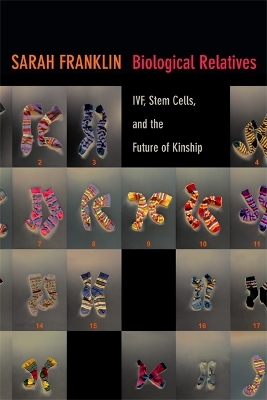
Biological Relatives
IVF, Stem Cells, and the Future of Kinship
Seiten
2013
Duke University Press (Verlag)
978-0-8223-5499-4 (ISBN)
Duke University Press (Verlag)
978-0-8223-5499-4 (ISBN)
Sarah Franklin explores the history and future of in vitro fertilization (IVF) thirty-five years and five million babies after its initial success as a form of technologically-assisted human reproduction.
Thirty-five years after its initial success as a form of technologically assisted human reproduction, and five million miracle babies later, in vitro fertilization (IVF) has become a routine procedure worldwide. In Biological Relatives, Sarah Franklin explores how the normalization of IVF has changed how both technology and biology are understood. Drawing on anthropology, feminist theory, and science studies, Franklin charts the evolution of IVF from an experimental research technique into a global technological platform used for a wide variety of applications, including genetic diagnosis, livestock breeding, cloning, and stem cell research. She contends that despite its ubiquity, IVF remains a highly paradoxical technology that confirms the relative and contingent nature of biology while creating new biological relatives. Using IVF as a lens, Franklin presents a bold and lucid thesis linking technologies of gender and sex to reproductive biomedicine, contemporary bioinnovation, and the future of kinship.
Thirty-five years after its initial success as a form of technologically assisted human reproduction, and five million miracle babies later, in vitro fertilization (IVF) has become a routine procedure worldwide. In Biological Relatives, Sarah Franklin explores how the normalization of IVF has changed how both technology and biology are understood. Drawing on anthropology, feminist theory, and science studies, Franklin charts the evolution of IVF from an experimental research technique into a global technological platform used for a wide variety of applications, including genetic diagnosis, livestock breeding, cloning, and stem cell research. She contends that despite its ubiquity, IVF remains a highly paradoxical technology that confirms the relative and contingent nature of biology while creating new biological relatives. Using IVF as a lens, Franklin presents a bold and lucid thesis linking technologies of gender and sex to reproductive biomedicine, contemporary bioinnovation, and the future of kinship.
Sarah Franklin holds the Professorship in Sociology at the University of Cambridge. She is the author of Dolly Mixtures: The Remaking of Genealogy and coeditor (with Susan McKinnon) of Relative Values: Reconfiguring Kinship Studies, both also published by Duke University Press.
Acknowledgments ix
Introduction. Relatively Biological 1
1. Miracle Babies 31
2. Living Tools 68
3. Embryo Pioneers 102
4. Reproductive Technologies 150
5. Living IVF 185
6. IVF Live 221
7. Frontier Culture 258
8. After IVF 297
Afterword 311
Notes 313
References 333
Index 351
| Reihe/Serie | Experimental Futures |
|---|---|
| Zusatzinfo | 30 illustrations, 1 table |
| Verlagsort | North Carolina |
| Sprache | englisch |
| Maße | 152 x 229 mm |
| Gewicht | 499 g |
| Themenwelt | Sachbuch/Ratgeber ► Gesundheit / Leben / Psychologie ► Lebenshilfe / Lebensführung |
| Studium ► 1. Studienabschnitt (Vorklinik) ► Histologie / Embryologie | |
| Studium ► 1. Studienabschnitt (Vorklinik) ► Med. Psychologie / Soziologie | |
| Naturwissenschaften ► Biologie | |
| Sozialwissenschaften ► Soziologie | |
| ISBN-10 | 0-8223-5499-3 / 0822354993 |
| ISBN-13 | 978-0-8223-5499-4 / 9780822354994 |
| Zustand | Neuware |
| Haben Sie eine Frage zum Produkt? |
Mehr entdecken
aus dem Bereich
aus dem Bereich
Zytologie, Histologie und mikroskopische Anatomie
Buch | Hardcover (2022)
Urban & Fischer in Elsevier (Verlag)
CHF 75,60
Gewebelehre, Organlehre
Buch | Spiralbindung (2024)
Urban & Fischer in Elsevier (Verlag)
CHF 34,95


